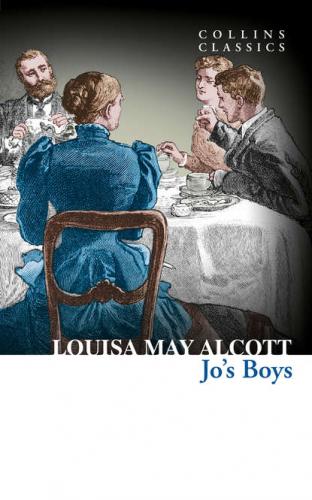JO’S BOYS
Louisa May Alcott
CONTENTS
Chapter 7: The Lion and the Lamb
Chapter 8: Josie Plays Mermaid
Chapter 11: Emil’s Thanksgiving
Chapter 14: Plays at Plumfield
Chapter 16: In the Tennis-Court
Chapter 22: Positively Last Appearance
Classic Literature: Words and Phrases adapted from the Collins English Dictionary
In 1819, millworker William Collins from Glasgow, Scotland, set up a company for printing and publishing pamphlets, sermons, hymn books, and prayer books. That company was Collins and was to mark the birth of HarperCollins Publishers as we know it today. The long tradition of Collins dictionary publishing can be traced back to the first dictionary William published in 1824, Greek and English Lexicon. Indeed, from 1840 onwards, he began to produce illustrated dictionaries and even obtained a licence to print and publish the Bible.
Soon after, William published the first Collins novel, Ready Reckoner; however, it was the time of the Long Depression, where harvests were poor, prices were high, potato crops had failed, and violence was erupting in Europe. As a result, many factories across the country were forced to close down and William chose to retire in 1846, partly due to the hardships he was facing.
Aged 30, William’s son, William II, took over the business. A keen humanitarian with a warm heart and a generous spirit, William II was truly “Victorian” in his outlook. He introduced new, up-to-date steam presses and published affordable editions of Shakespeare’s works and The Pilgrim’s Progress, making them available to the masses for the first time. A new demand for educational books meant that success came with the publication of travel books, scientific books, encyclopedias, and dictionaries. This demand to be educated led to the later publication of atlases, and Collins also held the monopoly on scripture writing at the time.
In the 1860s Collins began to expand and diversify and the idea of “books for the millions” was developed. Affordable editions of classical literature were published, and in 1903 Collins introduced 10 titles in their Collins Handy Illustrated Pocket Novels. These proved so popular that a few years later this had increased to an output of 50 volumes, selling nearly half a million in their year of publication. In the same year, The Everyman’s Library was also instituted, with the idea of publishing an affordable library of the most important classical works, biographies, religious and philosophical treatments, plays, poems, travel, and adventure. This series eclipsed all competition at the time, and the introduction of paperback books in the 1950s helped to open that market and marked a high point in the industry.
HarperCollins is and has always been a champion of the classics, and the current Collins Classics series follows in this tradition—publishing classical literature that is affordable and available to all. Beautifully packaged, highly collectible, and intended to be reread and enjoyed at every opportunity.
About the Author
Louisa May Alcott was born into a family of American transcendentalists, the second of four daughters. Transcendentalism was essentially a movement initiated in reaction to a feeling that society was eroding its mores and was consequently in need of reform. Alcott was therefore immersed in an environment of progressive thinking and intellectualization during her formative years. This included a strong moral objection to the notion of slavery, which would become the lynchpin of the American Civil War (1861–1865). The Alcotts hid a runaway slave in their house in 1847, such was their level of commitment to the cause.
During the war itself, Louisa May Alcott worked as a nurse and it was her experiences that served to hone her storytelling skill. It wasn’t until early middle age, however, that she became a success. In 1868 the first part of Little Women was published to great acclaim, and her reputation grew from there. However, her life was not a long one, for she died of ill health at the age of 55, in 1888.
Apart from the Little Women trilogy, she wrote many other novels and children’s stories, which are best
